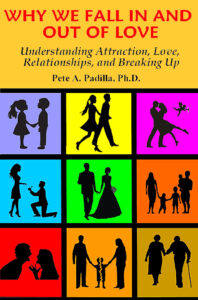“By staying in their brutal relationships, these abused types aren’t necessarily acting irrationally. Rather, they are seduced by the power of hope.”
– Pete A. Padilla
Sometimes when we observe someone “stuck” in an abusive relationship, we ask ourselves: How is this even possible? Why do they put up with such crappy behavior? The answer to these questions is that it’s the random aspect of their partner’s behavior that makes a bad relationship so difficult to break free from. By staying in their brutal relationships, these abused types aren’t necessarily acting irrationally. Rather, they are seduced by the power of hope.
Let’s take a look at the culprit: random reinforcement. This concept will make sense when we look at an experiment I learned about in an undergraduate psychology course. If I recall correctly, the study was conducted by a researcher named A. Fisher. Some readers may not like the fact that I’m comparing dogs to humans. This is understandable. These days, no human-subjects research committee would approve of an experiment involving such manipulation on human beings. Therefore, the experimental groups of dogs will have to suffice for our discussion of Random Reinforcement.
“A” Group
According to my recollections, the experiment went something like this. Three groups of dogs were segregated at a research dog kennel. In the first trial group (“A”), each of the dogs was given pretty much anything they wanted. All of the dogs were petted, scratched, allowed to sleep, played with, fed, and anything else the caretaker assessed would meet the dog’s desired immediate needs and/or wants. In short, nothing was denied any of the dogs in the group.
“B” Group
In the second study group (“B”), none of the dogs in this group were given anything but food, shelter, and/or any necessary life-sustaining medical attention. The caretakers did not pet, scratch, or give the dogs any type of unnecessary attention. Even their basic needs were met at random times. If the dogs barked in an attempt to receive attention, they were ignored. If the barking rose to intolerable levels, the dog was muzzled and isolated from the others in the group. This group of dogs was basically ignored. (They weren’t harmed or abused.)
“C” Group
In the third experimental group (“C”), the dogs were treated very well, yet were also ignored; though not at the same time. Their treatment regimen on any given day was governed by the pick of a daily lottery system. Ten pieces of paper were placed in a plastic bucket. The letter “A” was written on five pieces of paper. On the other five pieces of paper was written the letter “B.”
In the morning when the first caretaker arrived at the site housing the dog kennels, he/she would reach inside the bucket and pull out a single piece of paper. Whatever the piece of paper had written on it defined the type of treatment the dogs would receive for that day. For instance, if the piece of paper read “A,” the dogs were afforded treatment identical to the first group of dogs. If the piece of paper read “B,” the dogs were treated the same as the second group of dogs.
“Which group of dogs do you think developed the strongest bond with their caretakers?”
Which group of dogs do you think developed the strongest bond with their caretakers? Many people quickly jump to the conclusion that the answer to the question is the dogs in the first group. In the minds of the humans, these dogs were probably happy and content getting spoiled all day long. So it’s not surprising that when I pose this question to my students, they almost always think that it is group “A” that develops the strongest bond with their caretakers.
But think a little deeper about the dynamics of this experiment. The dogs in the first group quickly got used to getting anything they desired. This led them to become greedy, impatient, and generally selfish (these dogs became like cats- j/k). It didn’t take long for these dogs to become spoiled and obnoxious. Often times the dogs in this group wouldn’t listen to the commands of their caretakers. Given that the dogs would only interact with the caretakers when the dogs wanted or needed something, this first group of dogs’ bond with their caretakers was relatively weak. The dogs’ focus was upon themselves.
This second group of dogs never received much attention or any type of social reinforcement. Therefore, the dogs in this second group never came to expect much from their caretakers except for food and water. Moreover, the dogs’ needs were met only on a random schedule.
The dogs in this second group didn’t know any other type of social interaction. Ever since they were young, this seeming “neglect” was all they had ever known. These dogs figured out that no matter what they did, it didn’t have any real effect upon the interaction with their caretakers. Eventually they became lethargic and either just hung out in their pens, or they interacted mostly amongst themselves.
These dogs quickly learned that their caretakers couldn’t be manipulated. Having accepted their “fate,” the dogs in this group never “missed” any attention. Therefore, they never came to expect any either. The dogs in this group bonded rather weakly with their caretakers.
The dogs in the third group were never really sure what interaction outcomes were related to their caretakers’ behaviors. Since they were dogs, they had no conception of a lottery system (or of the concept of random reinforcement). All they knew was that sometimes they were treated great, and yet at other times, they were generally ignored.
It didn’t take long for the dogs in this third group to figure out that the interaction patterns between them and their caretakers weren’t very predictable. No matter how these dogs acted, it didn’t seem to change any interaction patterns with their caretakers (to their advantage or disadvantage). When the caretakers were nice, these dogs thoroughly enjoyed it! On the other hand, when the caretakers “ignored” these dogs, they merely accepted their fate and went about their own business. These dogs, however, soon learned to look forward to the time when they would again receive favorable treatment.
When this group of dogs randomly received positive interaction with their caretakers, they enjoyed it while it lasted. They didn’t question the “system” and would instead look forward to the days when they would be treated favorably. In short, because these dogs couldn’t take their caretakers’ positive interactions for granted, they soon learned to appreciate the favorable treatment on the days it existed. Thus, they developed a strong bond with their caretakers as they looked forward to the days of favorable interactions with them.
Since this third group of dogs was unable to predict or manipulate the actions of the caretakers in any predictable manner, they eventually gave up trying to directly manipulate the interactions between them and the caretakers. Instead of becoming proactive, they became passive and anxiously waited for the positive interaction from the caretakers. Once it “arrived,” they ate it up! They thoroughly enjoyed the favorable treatment whenever it was given to them. After all, it might have been awhile before they were treated nicely again. In short, the dogs in this group were never able to take the extra kindness for granted. What kept the dogs content was the hope they held on to for any future day of completely favorable treatment. Hope is a powerful force.
In sum, the random treatment never allowed the dogs in the third group to make any sort of connection between anything they had done and how they were treated. Therefore, these dogs always hoped for the best treatment. In the meantime, they endured whatever type of treatment was necessary as they looked with anticipation to the next day of favorable interaction.
The same logic applies to human beings. In the book The True Believer, Eric Hoffer (1951) discusses the power of hope in more detail. Let me say this again: hope is a powerful force.
In more instances than I’d like to think about, people fall victim to relationships plagued by unfavorable treatment because they cannot gain control of their torment. Their partner is generally an abusive jerk. Then seemingly out of the blue- and regardless of how the victim acts- the abusive partner starts acting nice. The victim soon learns that they cannot manipulate their partner’s abusive behavior to their favor. Thus, it doesn’t take long for them to stop trying to change their partner’s negative behavior. Instead they learn to endure it and quietly long for the time – some time in the future – when the partner will treat them favorably again.
People in randomly reinforced relationships will usually blame themselves if things in it aren’t panning out favorably. Furthermore, they will work even harder to change their perceived situation. When the abusive partner does treat them favorably, like the dogs in the third group, they won’t make a fuss; instead they will thoroughly enjoy it, knowing that it may be some time until such favorable treatment reoccurs.
Dean and Barbara are the Perfect Couple?
Dean and Barbara were a couple I had met through one of my college girlfriends. From the outside, they appeared to have the perfect relationship. They seemed to get along with each other; always acting affectionate as well as displaying what seemed like a genuine affection for one another. However, anyone who really knew each of the partners on a more intimate basis was aware that this display was mostly a façade. Dean and Barbara were putting on an act worthy of an Academy Award©. Behind closed doors, this seemingly “perfect” couple had serious relationship problems. They lived a secret life that involved a world of mental as well as physical abuse.
Barbara and a number of her female friends constantly hung out at my girlfriend’s and my condo. It was these women, minus Barbara of course, who let me in on the secret life of this seemingly perfect couple. Because these girls and I were privy to Dean and Barbara’s hidden world of abuse, we were all able to secretly discuss the on-going abusiveness amongst ourselves. Our exclusive group knew perfectly well what was really happening in that relationship, and needless to say, we all came to dislike Dean. However, because all of this talk about Dean took place in secret, none of us were able to directly confront Barbara (or Dean for that matter) about escaping such a secret, unpleasant relationship.
Because our group of friends knew what was actually happening between Dean and Barbara, all of us looked for opportunities to indirectly confront Barbara about the abuse she was secretly enduring. On occasion, Dean would leave some “evidence” of his abusive handiwork somewhere on Barbara’s body. In these cases, one of us would hint around at what we suspected, and would thus try and get Barbara to tell us about Dean’s abusive tendencies. But instead of admitting to being victimized by Dean, Barbara would invariably make up some sort of clever cover story to excuse Dean’s inexcusable actions. In all the time I knew Barbara, I never once witnessed her commenting negatively on Dean.
In one incident of what I like to refer to as “extreme abuse,” Dean became extremely upset with Barbara because he had accidentally gotten her pregnant. Despite his equal involvement in helping create the situation, Dean insisted that their problem was entirely her fault. In a fit of rage, Dean demanded that Barbara do whatever was necessary to “take care of the problem.” This meant that Barbara had to make all the necessary arrangements for an out-of-state trip to get an abortion. Moreover, Dean insisted that Barbara foot the entire bill for the procedure. Dean also insisted that Barbara keep this activity secret, which meant that at best, she would have limited social support during this very painful experience.
Shortly thereafter, Barbara flew to another state, and alone, she endured the pain and hardship involved with such an unpleasant procedure. Then, when Barbara returned from her ordeal, Dean never even brought it up. Dean, in fact, acted as though such an ordeal had ever happened. Suffice it to say that I wasn’t a fan of Dean.
After learning about the actual relationship between Dean and Barbara, my respect for Dean completely disappeared. And the more I learned about the sordid details, the less I cared to be around either of them. I just couldn’t act civil toward Dean knowing that he was a woman-abuser.
There were, however, two types of situations where I was almost guaranteed to have to interact with Dean and Barbara. While performing “boyfriend duties,” I would often see them together at planned social events; like a say a school banquet. In these relatively formal occasions, they, as well as everyone around them, put on a convincing act. At other times, I would have to interact with Dean while hanging out with the girls when they were busy with school-related activities.
Sometimes I would encounter Barbara apart from Dean. Again, this was normally during one of the times when “the girls” were hanging out at our condo. With Barbara around, though, none of the girls brought up the subject of Dean’s abuse. However, if Barbara wasn’t around, the women and I would talk about the issue of how Dean abused her. This type of behavior told me that Barbara didn’t suspect that I knew the truth about her and Dean. But in fact, I was aware of the abuse. So, every once in awhile I would ask her about a scar or scrape of hers that I already knew Dean had inflicted on her. But as I mentioned earlier, in these instances, Barbara would defend Dean by inventing some type of clever cover story.
Whenever I engaged in this sly, yet risky behavior, one of the girls would shoot me a “look” for even initiating that type of precarious interaction. Such a look silently said, “Don’t go there!” But “going there” produced some priceless information. I looked at my perceived mischief as a tradeoff. I would generally play along with the big act, but at the price of me being able to skirt the accepted discussion parameters with me throwing in a few random zingers. I’d catch hell later, but it was generally worth it. By doing this, I didn’t lose my own self-respect in the process. Morally, I could always claim at least some degree of non-compliance with the charade.
About a year after I had learned about the trials and tribulations of Dean and Barbara’s relationship, Dean was killed in a boating accident. A number of people privately rejoiced at the news, as did I. But publicly, everyone was very supportive of Barbara.
Later that week, as my female friends were getting ready to attend Dean’s funeral, they asked me whether or not I was going to attend it. I looked at them, and in a solemn tone, I told them that I just couldn’t fake any sympathy for Dean. I really couldn’t pretend that I cared about him; especially in a church setting. The women all concurred with my sentiments, but they had to attend Dean’s funeral service. “The girls” insisted that they had to support Barbara in her time of grief. That I could understand. They attended the funeral; I didn’t.
Some time elapsed before I saw Barbara again. So, when I did eventually run into her, she asked why I hadn’t attended Dean’s memorial service. I decided this was the perfect time to tell her the truth about how I felt regarding Dean. Because of my knowledge about his abusive actions, I told Barbara that I could not fake any sorrow for Dean. An instant of sheer ignorance, I express my utter disregard for Dean. If there is a type of person that I have no mercy for, it is a woman-beater.
As I admitted to Barbara that the whole time I had secretly known about Dean’s abusive behavior, and that I especially despised Dean, I could tell that she was beginning to act pensive. Plus, I had been very animated when I unloaded some of the more sordid details I was aware of when I disclosed to her my true feelings about Dean.
Perhaps I expected that because Dean was no longer a threat to her, Barbara would have viewed herself as emancipated- saved from a life of Dean’s induced misery. I figured that the more I let her know about the many details I knew about their relationship (and that I was empathetic to her plight), the more she would see that I was on her side in the matter. By unloading this rant about Dean’s abuses, I sincerely hoped that Barbara would realize I was trying to offer her some genuine empathetic understanding about what she had been through.
Despite any misgivings I had from knowing about the abuse she had endured, Barbara didn’t see the situation my way. On the contrary! The more I piled it on, the angry her she grew. A slow frown crept across her face, and I could see her starting to tremble as she attempted to hold back her sorrow. Her eyes welled up and tears begin to stream down her cheeks. Barbara was obviously trying not to cry.
Eventually, Barbara had had enough of my onslaught against Dean. She grabbed my arm and firmly told me to stop talking! Still trying not to cry, she said, “Yeah, but even though those days that I spent with him may have been some of the worst times of my life, they were also some of the greatest times of my life!” Barbara stopped trying to hold back crying, let go of my arm, and hurried into her nearby car. She started the engine, threw the car into gear, peeled out, and quickly sped away.
After the dust had settled, I brushed myself off and stood there bewildered at what had just happened. The only thing I was able to think about was how could I have missed out on seeing things from the angle Barbara had just expressed to me? I search my head for a hint of any favorable memory I can recall about the two. I couldn’t recall any, but that didn’t mean that Barbara was a liar. Just because I couldn’t recall any good memories of Dean didn’t mean that they didn’t exist. Obviously Barbara had experienced some good times with Dean during their time together.
As I stood there processing the scene that had just played out in front of me, a light bulb went on over my head. In those rare instances when Dean would have been affectionate or even nice to Barbara, she would have eaten them up! But because she had experienced many grievous days with Dean, those enjoyable times she had spent with him would have meant the world to her. In Barbara’s mind, life wasn’t all bad with Dean; they also had some great times together.
At that moment, I realized that it wasn’t any of the absolute behaviors that characterized their relationship, but rather, it was the ratio of good-to-bad experiences that mattered. I suddenly felt embarrassed by what I had just done to Barbara. Perhaps I had just ruined the remaining good memories she was hanging onto. Although I didn’t necessarily agree with her assessment of the relationship they shared together, I had to admit to myself that my interaction with Barbara that night forced me to learn something new about abusive relationships. After that night, I never heard from Barbara again.




